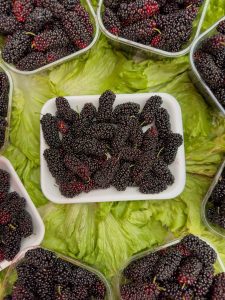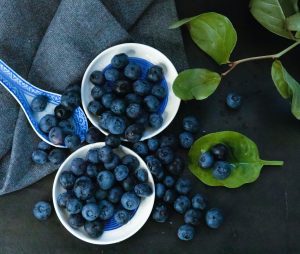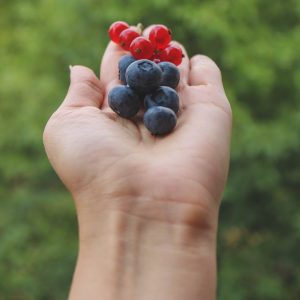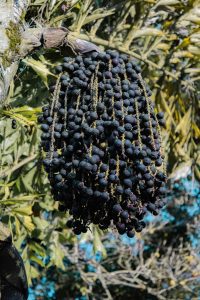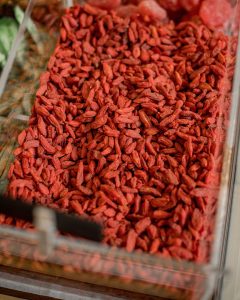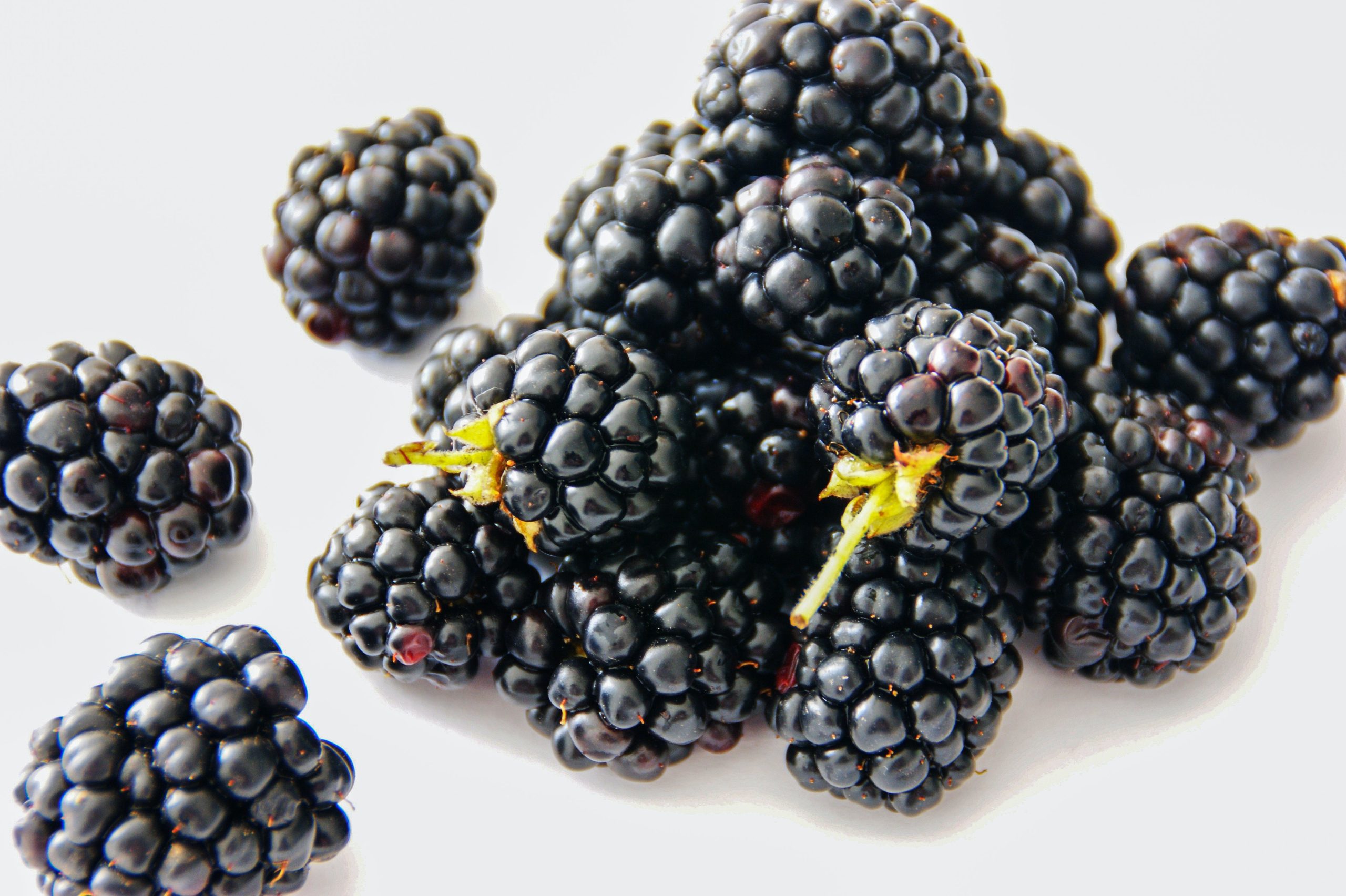
What are Blackberries?
Blackberries, belonging to the Rubus genus, are succulent, dark purple to black aggregate fruits renowned for their sweet-tart flavor and rich nutritional profile. These berries, composed of small drupelets clustered around a core, thrive in temperate climates and are widely cultivated globally. Bursting with vitamins C and K, dietary fiber, and antioxidants, blackberries offer numerous health benefits, supporting immune function and digestive health. Their anthocyanin content contributes to the deep color and antioxidant properties. Blackberries are enjoyed fresh, added to salads, desserts, or blended into smoothies, while also being processed into jams, jellies, and baked goods. With variations like thornless and erect cultivars making cultivation more accessible, blackberries have become a popular addition to home gardens. Their peak season varies regionally but generally falls in late spring to early summer. Blackberries stand as not only a delectable and versatile fruit but also a nutrient-packed option, contributing to a balanced and wholesome diet.
Why Do We Eat Blackberries?
People eat blackberries for a variety of reasons, ranging from their delicious taste to their numerous health benefits. Here are some key reasons why blackberries are commonly consumed:
- Rich in Nutrients:
- Blackberries are a nutritional powerhouse, containing vitamins C and K, manganese, folate, and dietary fiber. These nutrients contribute to overall health and well-being.
- Antioxidant Content:
- Blackberries are packed with antioxidants, including anthocyanins, which help combat oxidative stress in the body. Antioxidants play a role in reducing inflammation and supporting cellular health.
- Heart Health:
- The fiber, potassium, and anthocyanins in blackberries may contribute to heart health by supporting healthy blood pressure levels and reducing the risk of cardiovascular issues.
- Digestive Health:
- The high fiber content in blackberries promotes digestive regularity and helps prevent constipation. Dietary fiber is essential for maintaining a healthy digestive system.
- Weight Management:
- Blackberries are relatively low in calories and high in fiber, making them a satisfying and nutritious snack for those aiming to manage their weight.
- Versatility in Culinary Use:
- Blackberries are versatile in the kitchen, suitable for both sweet and savory dishes. They can be enjoyed fresh, added to salads, used in desserts, or blended into smoothies.
- Natural Sweetness:
- Blackberries have a sweet-tart flavor that makes them a delicious and naturally sweet addition to various dishes, reducing the need for added sugars.
- Seasonal Enjoyment:
- Blackberries are often in season during late spring and early summer, providing a seasonal treat for those who enjoy fresh, locally grown produce.
- Culinary Creativity:
- Blackberries inspire culinary creativity, appearing in a wide range of recipes, from pies and cobblers to jams, sauces, and even savory dishes.
- Cultural and Culinary Significance:
- Blackberries are celebrated in various culinary traditions and festivals, contributing to their cultural significance and widespread consumption.
Whether eaten fresh, frozen, or incorporated into various recipes, blackberries are cherished for their delightful taste, nutritional content, and versatility in culinary applications.
When Do We Eat Blackberries?
Blackberries are typically enjoyed during their peak season, which varies depending on the region and climate. Here are some general considerations regarding when people commonly eat blackberries:
- Late Spring to Early Summer:
- Blackberries are often in season during late spring to early summer, typically from May to July in many temperate regions. During this time, they are at their peak freshness, flavor, and abundance.
- Harvest Time:
- Blackberries are best enjoyed when freshly harvested. Depending on the variety and location, the harvest time may slightly vary. People often pick or purchase blackberries at local farms or markets during this period.
- Year-Round Availability:
- Due to advancements in cultivation practices and global trade, blackberries are available year-round in many grocery stores. They might be imported from regions where they are in season or grown in greenhouses to extend availability.
- Processed Products:
- Blackberries are also enjoyed in various processed forms throughout the year. This includes frozen blackberries, blackberry jams, sauces, and dried blackberries, allowing for consumption beyond the fresh fruit’s natural season.
- Desserts and Culinary Creations:
- Blackberries are commonly used in a variety of desserts, including pies, tarts, cakes, and as a topping for ice cream or yogurt. They are also added to salads, blended into smoothies, or incorporated into savory dishes.
- Culinary Events and Festivals:
- Blackberries are often featured in culinary events and festivals that celebrate the harvest season. These events showcase creative recipes and dishes that highlight the versatility of blackberries.
While late spring and early summer are prime times for enjoying fresh blackberries, advancements in agricultural practices have extended their availability, allowing people to enjoy these berries in various forms throughout the year.
Ingredients of Blackberries
Blackberries, being whole, natural fruits, don’t have a list of ingredients. However, they are composed of various components that contribute to their nutritional profile. Here are the main components of blackberries:
- Water:
- Blackberries have a high water content, contributing to their juiciness.
- Carbohydrates:
- The majority of the calories in blackberries come from carbohydrates, primarily in the form of natural sugars like fructose.
- Dietary Fiber:
- Blackberries are an excellent source of dietary fiber, promoting digestive health and providing a feeling of fullness.
- Vitamins:
- Blackberries contain essential vitamins, including vitamin C, vitamin K, and a variety of B-complex vitamins such as B1 (thiamine), B2 (riboflavin), B3 (niacin), B5 (pantothenic acid), and B6.
- Minerals:
- Blackberries provide various minerals, including manganese, copper, iron, magnesium, potassium, and calcium.
- Antioxidants:
- Blackberries are rich in antioxidants, including anthocyanins, quercetin, and ellagic acid. These compounds help combat oxidative stress in the body.
- Phytonutrients:
- Phytonutrients are plant compounds with potential health benefits. Blackberries contain flavonoids, tannins, and other bioactive compounds.
- Natural Sugars:
- Blackberries contain natural sugars, contributing to their sweet taste. However, they have a relatively low sugar content compared to some other fruits.
It’s important to note that the specific nutritional composition of blackberries can vary based on factors such as ripeness, cultivation methods, and the specific variety of blackberry. Overall, blackberries are not only delicious but also nutrient-dense, making them a healthy addition to a balanced diet.
Types of Blackberries
There are several varieties and cultivars of blackberries, each with its unique characteristics, flavor profiles, and growing conditions. Here are some common types of blackberries:
- Chester Thornless:
- Known for its lack of thorns, Chester Thornless is a popular blackberry variety. It produces large, sweet berries and is well-suited for home gardens.
- Triple Crown:
- Triple Crown blackberries are known for their large, flavorful berries and semi-erect growth habit. They are relatively easy to harvest and are resistant to certain diseases.
- Arapaho:
- Arapaho blackberries are an early-season variety, producing large and sweet berries. They have an erect growth habit and are suitable for both commercial and home cultivation.
- Navaho:
- Navaho blackberries are known for their high yields and firm, sweet berries. They are thornless and have a semi-erect growth habit.
- Natchez:
- Natchez blackberries are a thornless variety with large and flavorful berries. They are known for their disease resistance and high productivity.
- Ouachita:
- Ouachita blackberries are thornless and produce medium to large berries. They are valued for their sweet flavor and are resistant to various diseases.
- Prime-Ark Freedom:
- Prime-Ark Freedom is a primocane-fruiting blackberry, meaning it can produce fruit on first-year canes. It has thornless canes and produces large, sweet berries.
- Kiowa:
- Kiowa blackberries are known for their large and sweet berries. They have an erect growth habit and are well-suited for commercial cultivation.
- Apache:
- Apache blackberries are thornless and produce large, juicy berries. They have a semi-erect growth habit and are valued for their flavor and disease resistance.
- Cacanska Bestrna:
- This European blackberry variety is known for its sweet and aromatic berries. It has an erect growth habit and is often grown in Eastern Europe.
These are just a few examples of the many blackberry varieties available. When choosing a blackberry type, considerations such as climate, local growing conditions, and intended use (home garden or commercial production) play a significant role.
Signs of Ripe, Signs of Raw and Signs of Rotten Blackberries
Signs of Ripe Blackberries:
- Color:
- Ripe blackberries have a deep, glossy black color. Depending on the variety, they may also have a purplish hue.
- Texture:
- Ripe blackberries are plump, firm, and have a smooth texture. They should yield slightly to gentle pressure without being mushy.
- Shine:
- Ripe blackberries often have a natural sheen or gloss, indicating freshness and juiciness.
- Ease of Separation:
- Ripe blackberries should easily separate from the stem when gently pulled, indicating they are ready for harvest.
- Sweet Aroma:
- Ripe blackberries emit a sweet and pleasant fragrance. If they have a noticeable aroma, it’s a good sign that they are ripe and flavorful.
Signs of Unripe Blackberries:
- Color:
- Unripe blackberries may have a reddish or purplish color, indicating that they haven’t fully ripened.
- Firmness:
- Unripe blackberries will be harder to the touch and lack the plumpness associated with ripe berries.
- Difficulty Separating from Stem:
- Unripe blackberries may resist separation from the stem, requiring more effort to pick.
- Tart Taste:
- Unripe blackberries may taste tart or underdeveloped compared to their sweet, ripe counterparts.
Signs of Rotten Blackberries:
- Mold:
- Rotten blackberries often develop mold, visible as fuzzy patches or dark spots. Discard blackberries with visible mold.
- Soft or Mushy Texture:
- Rotten blackberries become soft, mushy, or may have a collapsed appearance. If the texture feels off and the berry is no longer firm, it may be spoiled.
- Offensive Odor:
- Rotten blackberries emit a strong, unpleasant odor. If the blackberries smell bad, they are likely spoiled.
- Dark or Discolored Areas:
- Dark spots, bruising, or unusual discoloration are signs of deterioration. Check for these on the surface of the blackberries.
- Leaking Juice:
- Excessive juice or a wet, sticky feel can be a sign of overripeness or spoilage.
When selecting blackberries, look for those that are uniformly colored, plump, and have a sweet aroma. Handle them gently to avoid bruising, and store them in the refrigerator to maintain freshness.
Summary
Blackberries, the succulent jewels of the Rubus genus, are prized for their luscious, dark-purple to black hue and a delightful combination of sweet and tart flavors. Composed of tiny drupelets clustered around a core, these berries thrive in temperate climates and boast a rich nutritional profile, including vitamins C and K, dietary fiber, and antioxidants. Blackberries are enjoyed during their peak season in late spring to early summer, offering a burst of freshness. Whether consumed fresh, added to salads, incorporated into desserts, or blended into smoothies, blackberries are versatile and celebrated for their culinary applications. With numerous varieties, including thornless and erect cultivars, blackberries are a popular choice for both home gardens and commercial cultivation, contributing to a balanced and healthful diet.

